Today, sustainability playing a more significant role than ever. In light of global challenges such as climate change and the increasing consumption of resources, our business practices and the decisions we make must be sustainable by design. You have probably already noticed: Sustainability affects all of us, and in particular when it comes to logistics, companies must lead the way by example.
We show you 4 possibilities of how sustainable logistics can create more value for your company and for society.
How do sustainability and logistics relate?
Worldwide each year, more than 100 billion packages are shipped, and this number continues to grow. Various studies show that the worldwide traffic in goods is responsible for 5.5 to 11 % of the total emission of pollutants. The assumption is that in Europe, every fifth to every second transport vehicle on the street is running empty. The transport and logistics industry therefore represents a huge burden on the Earth’s biosphere, including greenhouse gases, energy consumption, air pollution and garbage.
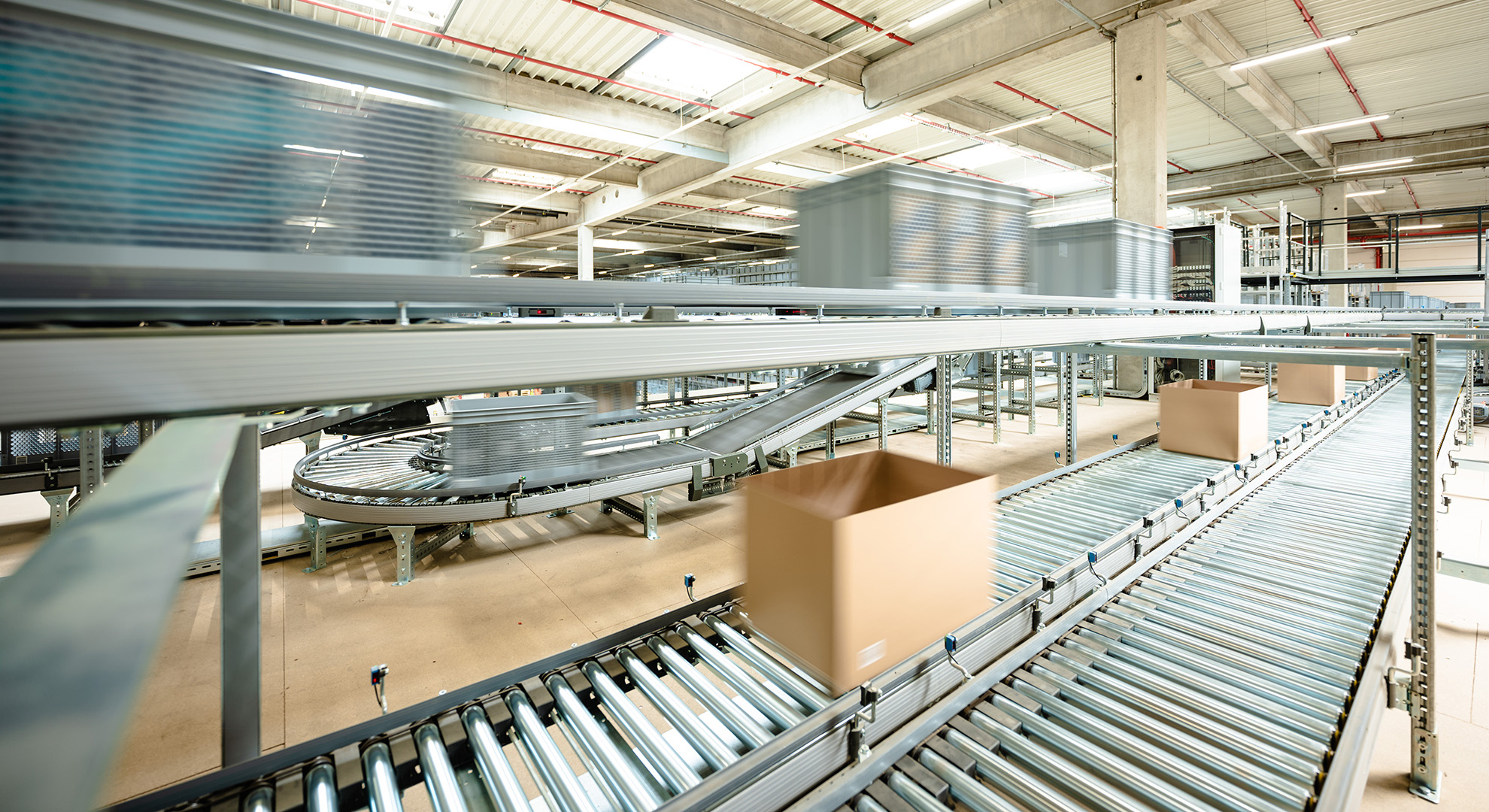
Even if the sustainable development does not depend exclusively on logistics, it can still contribute to change. These numbers show the great potential logistics holds for sustainability. With responsible value chains and sustainable actions, you can not only gain environmental advantages, but also economic efficiency and a competitive advantage, while complying with statutory requirements.
1. Sustainable logistics protects the environment
As you see, the transport and storage of goods affects the environment in many ways.
The logistics industry should take vital measures and implement sustainable practices in order to protect the environment and keep people healthy. Because the truth is: Sustainability in logistics minimizes the effects on the environment.
Here are possible measures your company can take:

Driving fewer miles reduces fuel consumption as well as CO2 Sustainable logistics means reducing the distance that goods are transported. Using software tools, the transport routes inside and outside the warehouse can be efficiently planned with the goal of reducing your environmental footprint. Using environmentally friendly means of transport also plays a role here.

Another important aspect with respect to sustainability in logistics is getting the packaging dimensions right. This reduces the packaging material used and the use of natural resources. Furthermore, using recyclable or environmentally friendly materials also contributes to a greener business.

The same applies to energy consumption. Consume as little energy as possible and draw it from renewable sources. Intelligent systems and robotic solutions are a great help in optimizing this. It really pays off: Warehouses using AMRs consume less energy and produce less CO2 than conventionally run warehouses.

For us at KNAPP, retrofitting systems are also of great importance (when it comes to sustainability and environmental protection). Instead of completely replacing a system that has become long in the tooth, you can revitalize your systems and make them state-of-the-art, using up-to-date software and mechatronic solutions. No extra steel has to be produced and waste from retrofitting the installation is minimal. This saves materials, costs and resources – a real win for the environment.
By integrating sustainable practices in the logistics industry, we make a difference for climate change, improve both air and water quality, and make wise use of the valuable resources from our biosphere – the Earth.
2. Sustainable logistics saves on costs
Economic and environmental sustainability can no longer be really separated from each other. Sustainable logistics is not just good for the environment – its beneficial to the economic success of your company. Initially, investing in sustainable logistics can be more expensive, however, over the long term, the return on this investment is substantial savings and a competitive advantage.
The improved efficiency of logistics activities and processes lowers your operating costs and saves energy. You can reduce unproductive planning and organizational activities , and furthermore, save on some personnel costs. Simultaneously, by intelligently combining transports, you avoid empty runs , an area of potential savings in both energy expenditure and emissions. As you can see, sustainability pertaining to both the environment as well as the economy go hand in hand.
A few examples demonstrate how our solutions can help make your logistics more sustainable and efficient:

Innovative technologies in the form of a digital twin model the system in the design phase. With a digital twin, you can test functions and performance and check individual parts of the system, which spares resources and makes the best use of time.
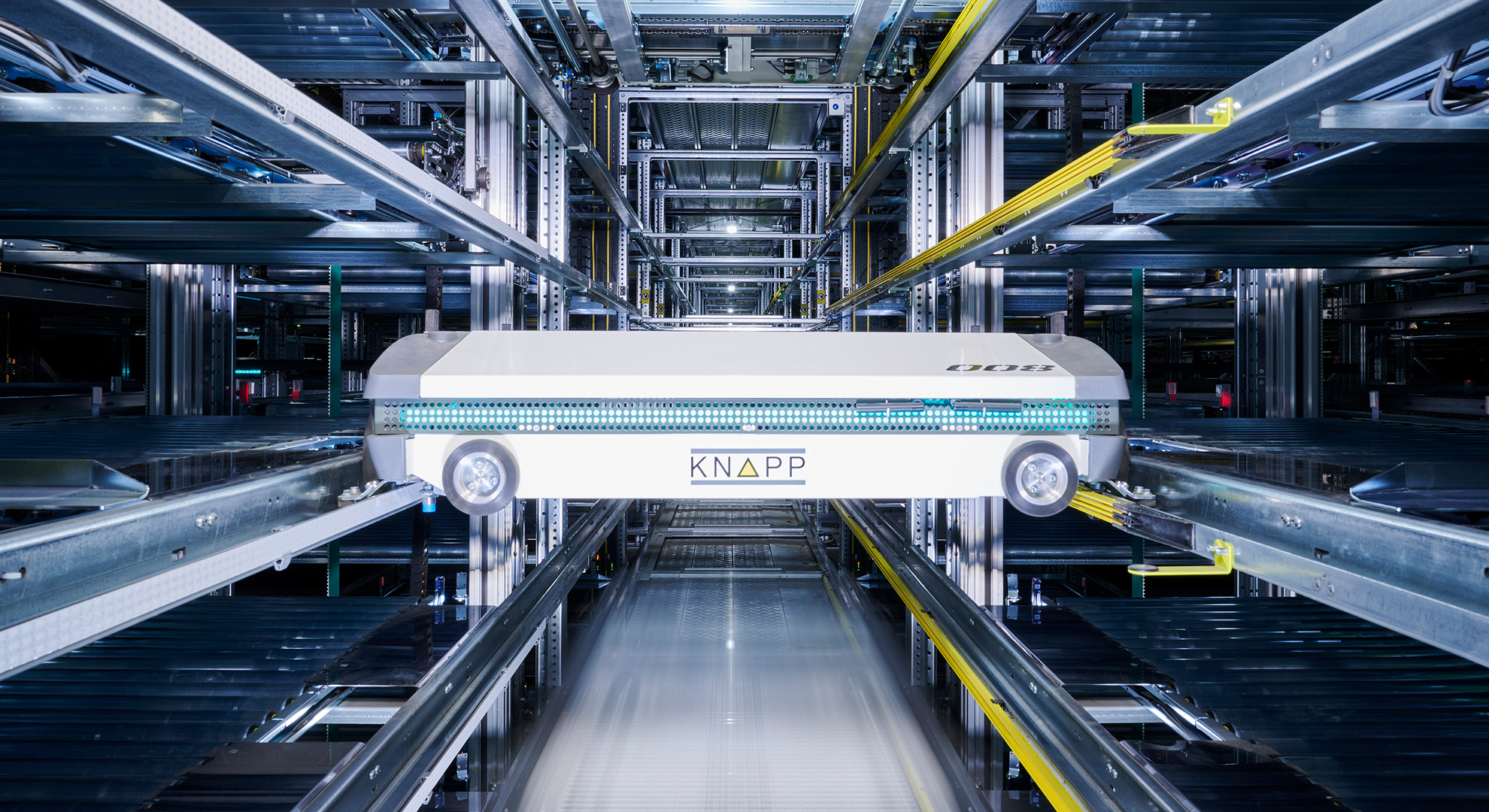
It takes efficient and intelligent shuttles to use expensive storage space in the warehouse optimally, and therefore profitably. Furthermore, the shuttles only move when required, and are equipped with energy recuperation technology which feeds braking energy back into the system.
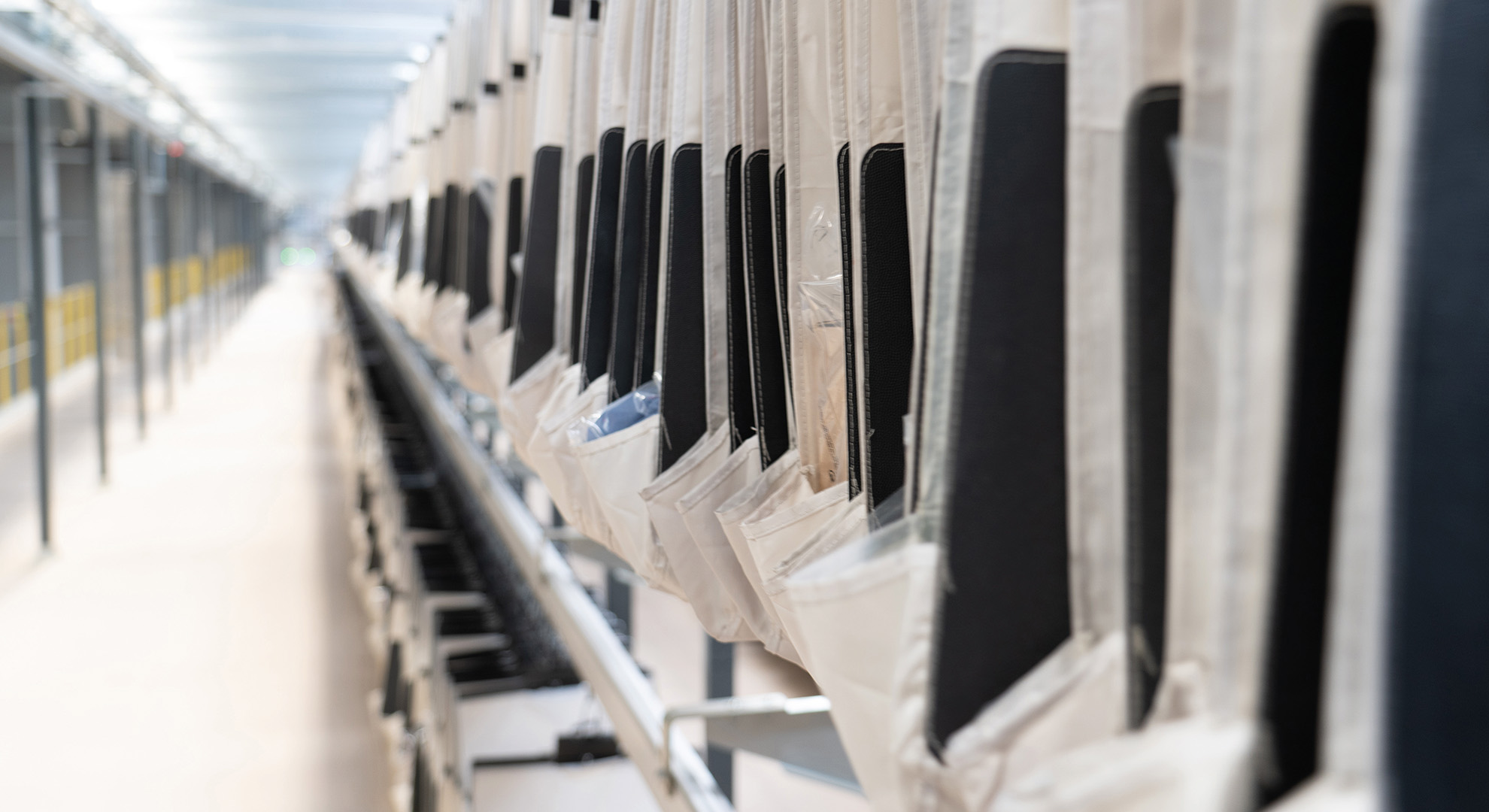
Pocket sorter systems release items automatically without loss of performance at any location in the warehouse. Not only are they efficient, these systems also save warehouse space, because items are hung and can be stored with high density.

Intelligent software provides the help needed to ideally pack load carriers. The load bed is optimally used, resulting in more CO2 savings.
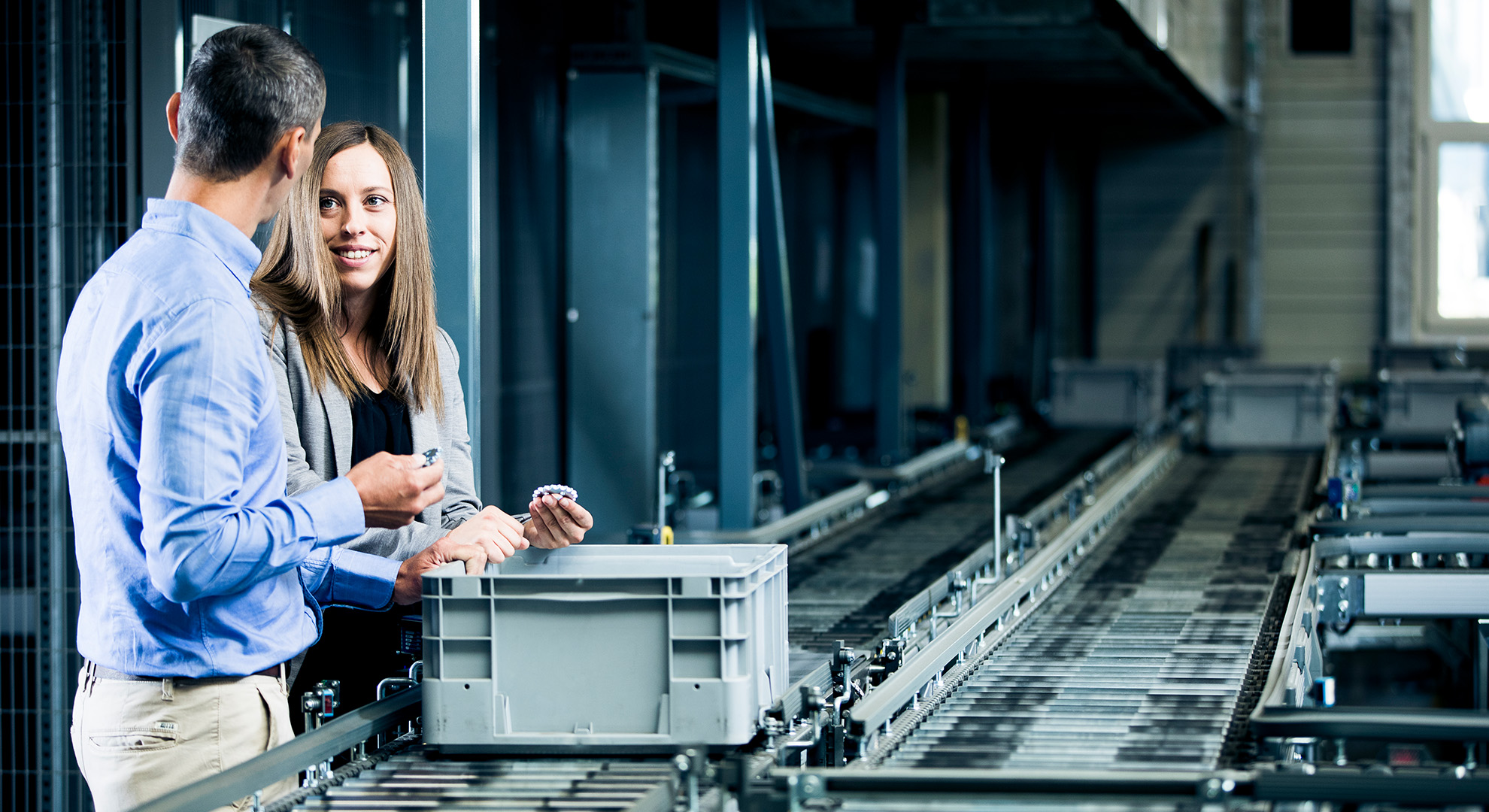
By retrofitting systems, you save the high cost of investment involved with a new warehouse. The existing warehouse is brought up to current state of the art. The benefits for customers are obvious: Retrofitting reduces the costs of production, transport and waste disposal. Plus, the process can take place during ongoing operation in the warehouse or production facility.
By efficiently using storage areas, implementing intelligent warehouse management systems and optimizing storage and distribution processes, you can lower your warehouse costs over the long run. Reducing the need for space and improving stock management saves costs.
We would like to introduce you to one of our sustainable solutions:
EXAMPLE: Reducing packages
Who hasn’t been in this situation? Goods ordered online come in a carton that is much too large, stuffed full of filling materials, so waste and air are being shipped. This is not only aggravating to the consumer, it’s also inefficient. This not only produces waste, but space is also wasted in delivery vehicles, just to transport air. Is there a way to do packaging more intelligently? What can we do, as a technology company, to effect something in this area?
To solve this problem, we developed an automated solution to minimize the quantity of filling material and carton in the packaging process. This is how you produce less waste, less CO2 and save costs. Here’s how it works:
The carton is precisely adapted to the size of the goods. A software calculates how large a carton needs to be. Finally, it is produced by a packaging machine. We have worked with the company Packsize to devise a fully automated solution for picking and packing goods, which is already being successfully used by a few online retailers.
The customized cartons are produced in one of two ways:
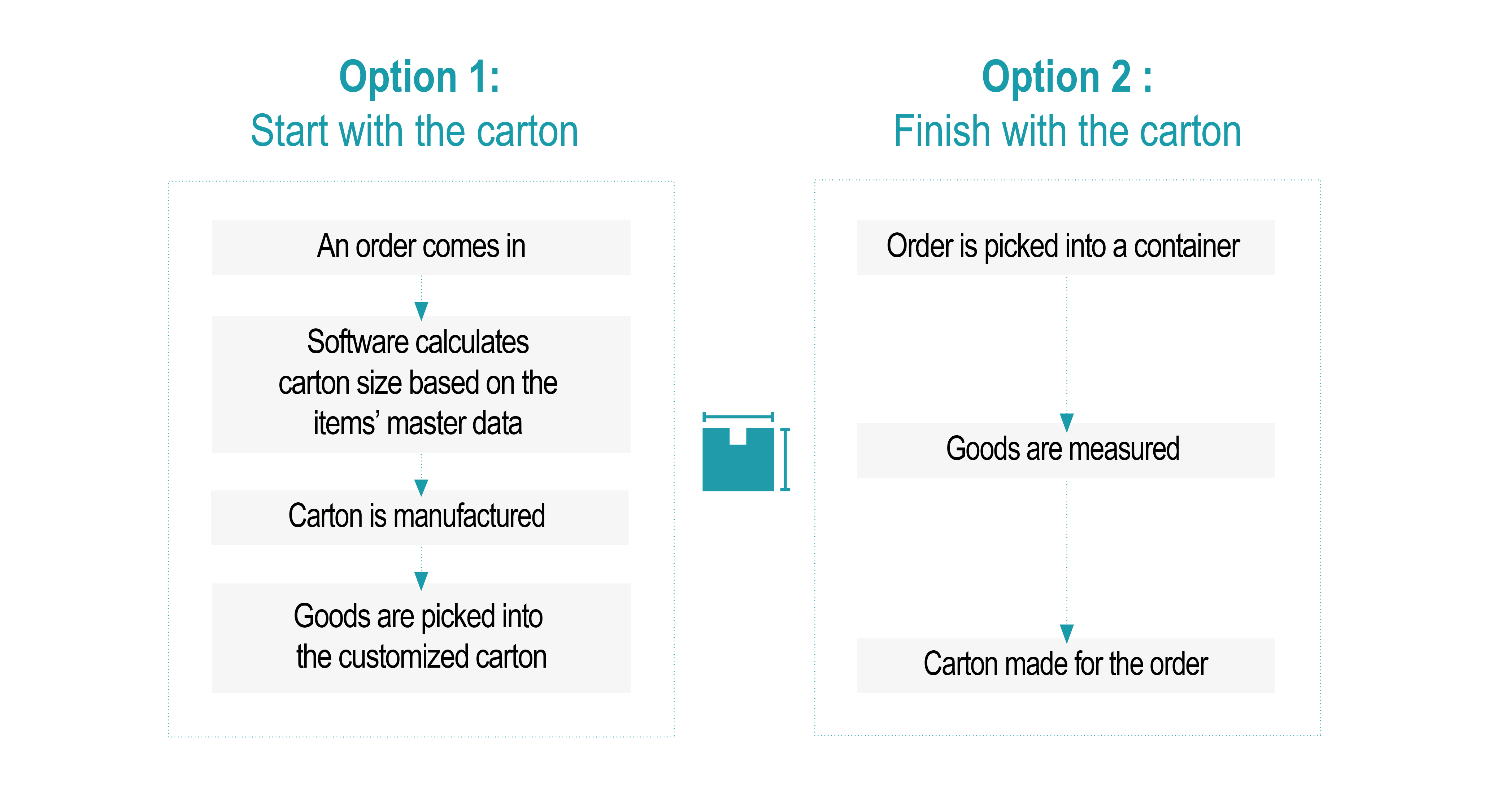
Based on an international retailer of sport fashion, who ships about 6.2 million cartons per year, here is an example of how much savings can be gained just on intelligent packing of the carton alone. Savings that can be attributed to transport (e.g. more space for more packages) are not included.
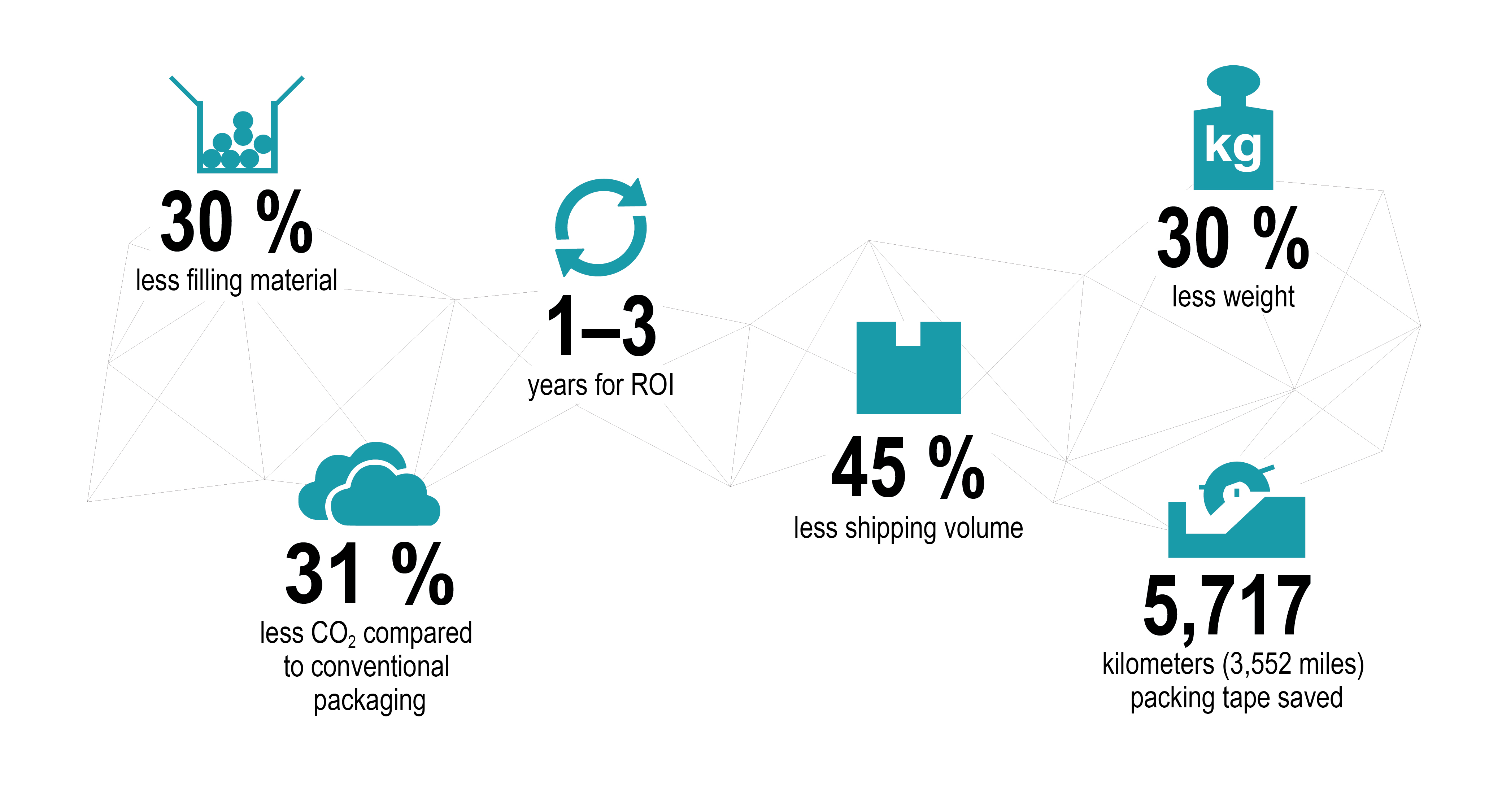
3. Rising demand from customers for more sustainability
In the past years awareness for environmental problems and social responsibility has increased greatly. Not only are consumers placing greater value on environmentally friendly behavior, but businesses as well recognize the necessity of integrating principles of sustainability into their business activities. This has all led to a change in the mindset and behavior of companies and customers alike. Both groups face the real effects of climate change in day-to-day life, their loyalties are moving towards companies who continually strive to contribute to a sustainable future.
The growing need for sustainability was confirmed in a study conducted by the IPC, regarding online trade in the B2C sector. More than half of the participating online buyers wanted sustainable delivery options and preferred reusable packaging. 73 % would be happy to receive a package a day later, if by doing so, the environmental impact was reduced [1].
One thing is clear: Customers prefer companies who supply their products and services sustainably. With these results, it’s no wonder that global players in online retail are urgently looking for more sustainable logistics solutions. Sustainability is now a much more important factor in being competitive on the market.
Purchasing behavior has also changed. Customers want to know where their products come from, and whether they were sustainably produced and transported. Companies who can provide this information transparently have a real advantage: They gain new customers and earn long-term loyalty from their existing customers. This shows that just offering the lowest price does not determine who gets the order. Today, the entire package is what wins consumer loyalty. This includes environmental compatibility and sustainability in production and logistics activities.
Companies who make the change to environmentally friendly logistics benefit not only from the advantages for the entire company, but also from profitability and better employee retention. Sustainable logistics also means an improved company image and builds a positive reputation. Companies that act in a socially and environmentally responsible manner are perceived as responsible and future oriented. This can translate into increased customer confidence and improved access to finance.

4. Legal regulations encourage more sustainability in logistics
Finally, legal parameters are providing a basis for more sustainability in logistics. Governments and authorities at the national and international levels are introducing ever more strict regulations and standards in order to reduce negative effects on the environment and to promote sustainable economic practices. Companies who transition to sustainable logistics early on will be better prepared to comply with the changing legal parameters. They will be able to avoid potential penalties and can continue to do business without being impinged upon by new provisions.

Now, let’s a have a look at which legal regulations and international sustainability goals must be especially observed:
Sustainable Development Goals
The goals for sustainable development comprise 17 related sustainability goals, which the countries of the United Nations agreed to in 2015. They serve as a common draft for ending poverty, protecting the planet and for ensuring peace and prosperity for all people by 2030. These sustainability goals are also known as the Sustainable Development Goals (SDGs).
European Green Deal
The European Green Deal was first introduced by the European Commission in 2019. All 27 Member States have agreed to make the EU the first climate-neutral continent by 2050. These statutory obligations will transform the EU into a modern, resource-efficient and competitive economy, ensuring
- no net emissions of greenhouse gases by 2050,
- economic growth is decoupled from resource use,
- no one is left behind, neither person nor place.
More advantages from sustainable logistics
Sustainable logistics offers a variety of advantages, both for your company as well as for society. A few of these have already been introduced to you. In this section, we would like to show you more advantages that come from sustainability in logistics for you as an employer, partner or company:
- Easier workforce recruitment:Not only customers are demanding more sustainability. Employees also place more value on sustainability when choosing where they want to work. In these times of skilled labor shortage in logistics, every advantage counts when recruiting. When your company practices sustainable logistics, it becomes more attractive for potential as well as existing employees. This strengthens employer branding and employees can better identify with the company and its values.
- Sustainability in partnerships: When your company values sustainable logistics and responsible value chains, you become more attractive to not only customers and potential employees, but also to suppliers. They too are more likely to want to work with companies that act in a socially responsible way. This helps to build solid, long-term partnerships that ensure resilient and transparent supply chains.
- Sustainability over the long haul: Sustainable business practices ensure that the long-term existence of the company is secured. By treating resources of all kinds respectfully, the company can remain profitable over time. Acting socially responsible and protecting the environment translates into a positive company reputation.

All the reasons make it clear, the sustainability in logistics not only offers environmental advantages, but also economic and strategic value. Sustainable logistics creates a win-win situation for your company, the environment and society:
- You address environmental issues and protect the earth’s biosphere.
- You make sure that your actions are profitable and efficient over the long run.
- You reinforce your employer branding, reduce risk to your reputation and build customer loyalty.
- You form solid relationships with suppliers and ensure resilient and transparent supply chains.
- You can meet the rising requirements and rules.
Sustainable logistics is an important step in making the logistics industry fit for the future and to promote sustainable development.
Would you like to make the sustainable transition in your logistics? Or would you like to find out more about the topic itself? We’re happy to advise you on how you can implement sustainable logistics for your business. Drop us a line at blog@knapp.com and schedule a meeting with one of our experts today.
[1] International Post Corporation (2023). Cross-Border E-Commerce Shopper Survey. https://www.ipc.be/services/markets-and-regulations/cross-border-shopper-survey
Further reading recommendations

In logistics, the last mile frequently includes many hurdles to jump that require significant resources. Perfect planning and flexible processes are key to turning these challenges into advantages, such as positive customer experience and reduced costs.

Imagine a world where you can use a single platform to optimize your logistics processes, provide innovations such as automation technology and integrate them all in your SAP® IT landscape. SAP BTP makes it a reality. Discover more in our blog post.

Autonomous mobile robots (AMRs) facilitate flexible, efficient transport processes. Whether deployed in manufacturing, food retail or in distribution logistics – their range of use is wide. Discover more about this future-oriented technology.
